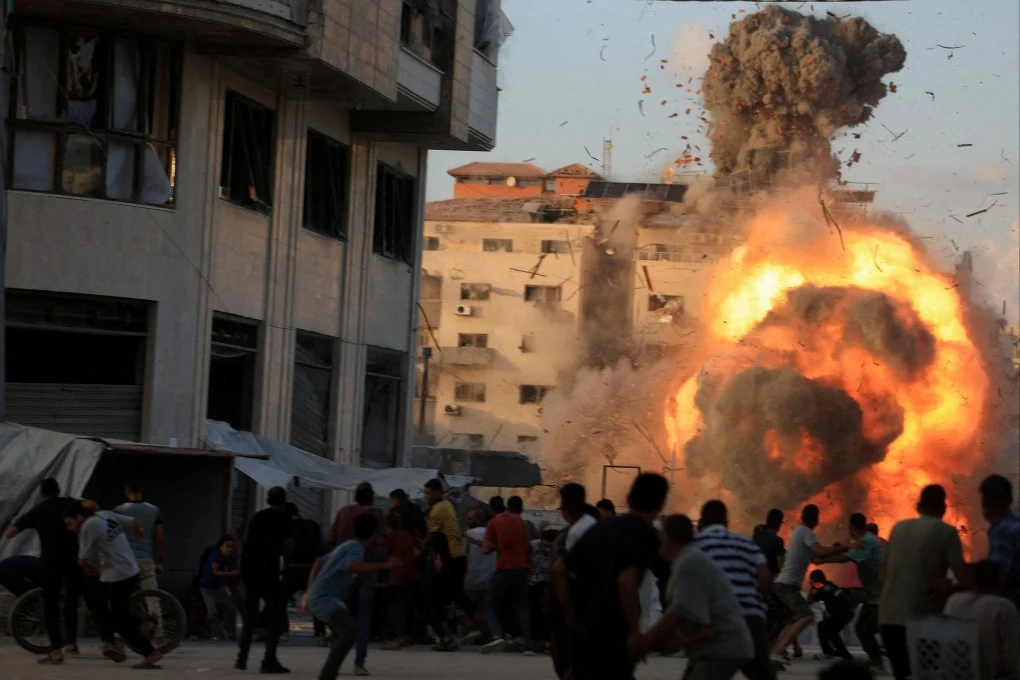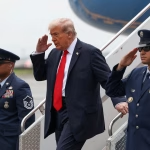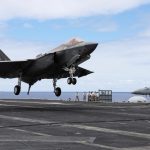The ongoing war in Gaza has become one of the most pressing global crises of the decade, drawing the attention of world leaders, international organizations, and millions of people who anxiously await news of peace. Recently, former U.S. President Donald Trump reignited discussions by announcing that a potential deal on Gaza could be reached soon. Alongside this optimistic statement, however, he issued what he described as a “last warning” to Hamas, signaling a stark blend of diplomacy and confrontation. Trump’s remarks have stirred debate not only about the future of the Israeli-Palestinian conflict but also about America’s role in brokering peace in the Middle East.
- The Context Behind Trump’s Gaza Statement
- What Trump’s ‘Last Warning’ to Hamas Means
- Reactions from Israel and Palestinian Authorities
- International Responses and Global Stakes
- The Humanitarian Dimension of the Gaza Crisis
- The Role of Regional Players in a Gaza Deal
- Can Trump Really Deliver a Gaza Peace Deal?
- Expert Opinions on Trump’s Approach
- FAQs
- What did Trump mean by a deal on Gaza coming soon?
- What is Trump’s ‘last warning’ to Hamas about?
- How has Israel responded to Trump’s comments?
- How have Palestinians reacted?
- What role do regional powers play in Gaza negotiations?
- Conclusion
This development raises critical questions. Can a deal truly be achieved in Gaza after decades of violence, mistrust, and failed negotiations? Does Trump’s tough tone against Hamas represent a realistic pathway to peace, or does it risk escalating tensions further? To understand these dynamics, it is essential to explore the background of the conflict, Trump’s diplomatic approach, the reactions from global players, and what this all means for the people caught in the crossfire.
The Context Behind Trump’s Gaza Statement
The Israeli-Palestinian conflict has been simmering for over 70 years, marked by wars, failed peace accords, and cyclical violence in Gaza. Since Hamas took control of Gaza in 2007, the territory has faced repeated blockades, military operations, and humanitarian crises. The United Nations estimates that over 2.2 million people in Gaza live under severe restrictions, with limited access to clean water, electricity, and medical care.
Trump’s remarks about a possible deal came at a moment when violence once again flared between Israel and Hamas. Cross-border rocket fire, Israeli airstrikes, and civilian casualties have put immense international pressure on both sides to negotiate a ceasefire. Trump’s “last warning” appears aimed at deterring Hamas from further escalation while simultaneously presenting himself as a potential peace broker.
During his presidency, Trump took a hardline stance on Middle East politics. He moved the U.S. Embassy to Jerusalem, recognized Israeli sovereignty over the Golan Heights, and brokered the Abraham Accords, which normalized relations between Israel and several Arab states. Supporters say these moves strengthened U.S.-Israel ties and opened new avenues for peace. Critics argue they marginalized Palestinians and deepened divisions. Against this backdrop, Trump’s comments on Gaza are both unsurprising and highly consequential.
What Trump’s ‘Last Warning’ to Hamas Means
Trump’s warning to Hamas carries both rhetorical weight and strategic implications. By framing it as a final warning, he seeks to apply maximum pressure on Hamas to either come to the negotiating table or risk further isolation. For Hamas, this could be interpreted as an ultimatum: cease hostilities or face a stronger international coalition against them.
Military analysts note that warnings like this can serve two purposes. First, they signal deterrence, reminding adversaries of the potential costs of continued aggression. Second, they provide a diplomatic opening—by offering a chance to avoid escalation if demands are met. However, the effectiveness of such statements depends on credibility. Hamas may dismiss Trump’s comments as political posturing unless they see tangible support from Israel, regional players, and the current U.S. administration.
Reactions from Israel and Palestinian Authorities
Israel has largely welcomed Trump’s involvement in Middle East negotiations in the past, particularly the Abraham Accords. Israeli officials view his strong stance against Hamas as aligning with their own security objectives. Prime Minister Benjamin Netanyahu has consistently argued that Hamas must be disarmed before any lasting peace can be achieved.
On the Palestinian side, reactions are more skeptical. The Palestinian Authority, based in the West Bank, has historically criticized Trump’s policies as biased toward Israel. For Hamas, Trump’s warning is unlikely to shift their core strategy, though it may complicate their relations with regional allies like Qatar and Turkey, who are often key mediators in ceasefire negotiations.
International Responses and Global Stakes
Trump’s remarks have not gone unnoticed on the international stage. The European Union, which has been a consistent supporter of a two-state solution, expressed cautious optimism about the possibility of a deal but urged both sides to prioritize humanitarian concerns. The United Nations, meanwhile, emphasized that any agreement must include provisions for Gaza’s civilian population, nearly half of whom are under the age of 18.
From Washington, the Biden administration has remained measured in its response, balancing support for Israel’s security with calls for restraint. Analysts suggest that Trump’s comments could complicate diplomatic messaging from the U.S., as foreign governments may be uncertain about whether to prioritize official White House statements or Trump’s high-profile interventions.
The stakes are enormous. Gaza’s humanitarian crisis is worsening, and without a durable ceasefire, the region risks spiraling into a prolonged conflict with devastating consequences for civilians and regional stability.
The Humanitarian Dimension of the Gaza Crisis
While high-level diplomacy garners headlines, the humanitarian crisis in Gaza continues to unfold in tragic silence. According to the World Health Organization, more than 50% of hospitals in Gaza are either partially functioning or completely shut down due to damage and lack of resources. Food insecurity is rampant, with the World Food Programme reporting that nine out of ten families lack regular access to nutritious meals.
For civilians, a political deal is not an abstract concept—it is the difference between survival and catastrophe. Parents in Gaza face impossible choices daily: whether to risk sending their children to school under threat of airstrikes or keep them home without access to education. Families live with only a few hours of electricity per day, and clean water is a luxury rather than a basic right.
Trump’s promise of a possible deal may offer hope, but unless it directly addresses these humanitarian needs, its impact will remain limited for the people who need relief the most.
The Role of Regional Players in a Gaza Deal
Any serious effort to negotiate peace in Gaza must involve regional stakeholders. Egypt has historically played a crucial role in mediating between Israel and Hamas, often brokering ceasefires after outbreaks of violence. Qatar provides financial aid to Gaza, while Turkey and Jordan maintain political influence in Palestinian affairs.
If Trump’s comments signal the start of a new diplomatic push, these regional actors will likely be essential partners. Their ability to pressure Hamas, offer incentives for restraint, and ensure compliance with any deal could determine whether negotiations succeed or fail. At the same time, Arab nations that signed the Abraham Accords may play a larger role, seeking to balance new ties with Israel while demonstrating solidarity with Palestinians.
Can Trump Really Deliver a Gaza Peace Deal?
The question at the heart of Trump’s remarks is whether he can actually deliver a peace deal. His track record includes both breakthroughs, such as the Abraham Accords, and setbacks, like the failure of the “Deal of the Century” peace plan that was rejected by Palestinian leaders.
Trump’s unique style of diplomacy—combining bold public statements with behind-the-scenes dealmaking—has worked in some contexts but struggled in others. The complexity of the Gaza conflict, with its layers of history, ideology, and regional politics, presents a formidable challenge. Still, his influence over certain U.S. political and international circles cannot be ignored.
Expert Opinions on Trump’s Approach
Experts are divided on the viability of Trump’s Gaza strategy.
Middle East scholar Dr. Mona El-Shazly argues, “Trump’s last warning to Hamas is a calculated move. It may not end the conflict, but it increases the pressure on all parties to at least consider de-escalation.”
Conversely, human rights advocate Daniel Levy warns, “Peace cannot be built on ultimatums alone. A real solution requires addressing Palestinian rights, sovereignty, and economic viability. Anything less will only delay the next round of violence.”
These contrasting views highlight the delicate balance between deterrence and diplomacy in one of the world’s most entrenched conflicts.
FAQs
What did Trump mean by a deal on Gaza coming soon?
Trump suggested that ongoing efforts could result in a ceasefire or political arrangement in Gaza. His statement aimed to build optimism around the possibility of negotiations while warning Hamas against further violence.
What is Trump’s ‘last warning’ to Hamas about?
The warning is intended to pressure Hamas into halting rocket attacks and participating in peace talks. It signals that continued aggression could trigger stronger international and possibly military responses.
How has Israel responded to Trump’s comments?
Israel has generally welcomed Trump’s involvement, seeing his tough stance on Hamas as consistent with its own security priorities. Israeli leaders view any potential deal as an opportunity to reduce rocket threats.
How have Palestinians reacted?
The Palestinian Authority remains skeptical, criticizing Trump’s past policies as pro-Israel. Hamas is unlikely to shift its core positions but may face pressure from regional allies to consider de-escalation.
What role do regional powers play in Gaza negotiations?
Countries like Egypt, Qatar, Turkey, and Jordan play key roles in mediating and supporting ceasefire agreements. Their cooperation is crucial for any lasting peace.
Conclusion
Trump’s announcement that a deal on Gaza could come soon, paired with his stern “last warning” to Hamas, has once again put him at the center of Middle East diplomacy. While the statement offers a glimmer of hope for de-escalation, it also underscores the immense challenges ahead. The conflict in Gaza is not merely a political standoff but a humanitarian emergency affecting millions of lives.
Whether Trump’s strategy of mixing ultimatums with promises of negotiation will succeed remains to be seen. For the people of Gaza, however, the urgency is undeniable. Peace is not an abstract political goal—it is the chance to rebuild homes, reopen schools, and reclaim dignity in daily life. Any deal that emerges must go beyond military calculations and address the human cost of this enduring conflict. Only then can talk of peace transform into a reality that brings lasting relief to one of the world’s most troubled regions.









